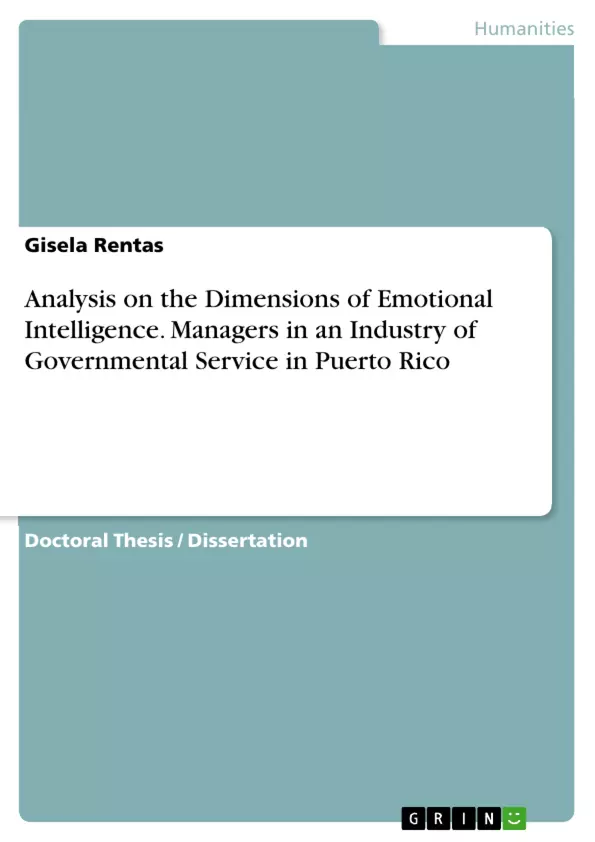This study analyses emotional intelligence with special regard to leadership.
Emotions are a mood that is characterized by an organic commotion, product of an external situation, and that can be translated in gestures, laughter or weeping. All the emotions are, in essence, impulses to act. For Freytes, it is what causes that we approach or we move away to a certain person or circumstance. We induce this way, because using the emotions helps to understand our position, the relation with the world and to respond of adaptive form. Palmer reveals that this notion is the fundamental reason of a vision that considers to the emotions like motives forces that adapt in an approach of cognition activities and by consequence it is the impetus for the development of construct of emotional intelligence.
Table of Contents
- CHAPTER I: Introduction
- Intelligence
- Multiple intelligences
- Emotional intelligence
- Final Reflection
- Intention of the Study
- Justification of the Study
- Problem of Investigation
- Terms of the Study
- CHAPTER II: Revision of Literature
- CHAPTER III: Method
- Theoretical frame
- Design
- Sample
- Instrument
- Translation of the Instrument
- Validity of content
- Determination of trustworthiness
- Procedure
Objectives and Key Themes
This dissertation aims to analyze the dimensions of emotional intelligence within a sample of managers in Puerto Rican governmental service. The study seeks to understand the prevalence and application of emotional intelligence within this specific professional context.
- Emotional Intelligence in the Workplace
- Emotional Intelligence and Managerial Performance
- Cultural Influences on Emotional Intelligence
- Methodology of Emotional Intelligence Measurement
- Application of Emotional Intelligence in Governmental Service
Chapter Summaries
CHAPTER I: Introduction: This introductory chapter lays the groundwork for the dissertation by defining key concepts such as intelligence, multiple intelligences, and emotional intelligence. It establishes the study's intention, justification, research problem, and key terms. The chapter highlights the gap in research concerning emotional intelligence within the context of Puerto Rican governmental service managers, thus providing the rationale for the investigation. It sets the stage for the subsequent literature review and methodological approach.
CHAPTER II: Revision of Literature: This chapter delves into a comprehensive review of existing literature related to emotional intelligence. It explores various theoretical frameworks, research findings, and established methodologies concerning the measurement and application of emotional intelligence across different professional settings. The review likely synthesizes information from relevant studies, articles, and books to build a strong foundation for the research. It positions the current study within the broader context of existing research on emotional intelligence.
CHAPTER III: Method: This chapter outlines the methodology employed in the dissertation. It details the theoretical framework guiding the study, the research design, and the characteristics of the sample population (Puerto Rican governmental service managers). The chapter meticulously describes the instrument used to measure emotional intelligence, including its translation process, validation procedures (content validity), and methods to ensure trustworthiness and reliability of the data. It also outlines the procedures followed in data collection and analysis.
Keywords
Emotional intelligence, managerial effectiveness, governmental service, Puerto Rico, questionnaire, validity, reliability, cultural context, workplace, performance.
Frequently Asked Questions: Dissertation on Emotional Intelligence in Puerto Rican Governmental Service
What is the overall topic of this dissertation?
This dissertation analyzes the dimensions of emotional intelligence among managers in the Puerto Rican governmental service. It investigates the prevalence and application of emotional intelligence within this specific professional context.
What are the key themes explored in the dissertation?
The key themes include emotional intelligence in the workplace, the relationship between emotional intelligence and managerial performance, the influence of culture on emotional intelligence, the methodology of measuring emotional intelligence, and the application of emotional intelligence within governmental service.
What does the Table of Contents reveal about the dissertation's structure?
The dissertation follows a standard academic structure. It begins with an introduction defining key concepts and outlining the research problem. This is followed by a literature review, a detailed methodology section explaining the research design and data collection methods, and presumably, a results and discussion section (not explicitly detailed in the provided preview). The preview includes chapter summaries of the introduction, literature review, and methodology.
What are the main objectives of the study?
The primary objective is to analyze the dimensions of emotional intelligence among Puerto Rican governmental service managers. The study aims to understand how emotional intelligence is prevalent and utilized within this specific professional group.
What is the methodology used in this study?
The methodology section details the theoretical framework, research design, sample selection (Puerto Rican governmental service managers), the instrument used for measuring emotional intelligence (likely a questionnaire), the translation and validation of the instrument, and procedures for ensuring data trustworthiness and reliability.
What are the key terms or keywords used in this dissertation?
Key terms include emotional intelligence, managerial effectiveness, governmental service, Puerto Rico, questionnaire, validity, reliability, cultural context, workplace, and performance.
What is covered in the introduction chapter?
The introduction defines key concepts like intelligence, multiple intelligences, and emotional intelligence. It states the study's purpose, justification, research problem, and key terms. It also highlights the gap in research on emotional intelligence within the context of Puerto Rican governmental service managers.
What is covered in the literature review chapter?
The literature review comprehensively examines existing research on emotional intelligence, exploring theoretical frameworks, research findings, and methodologies related to its measurement and application across different professional settings. It positions the current study within the broader context of existing research.
What is covered in the methodology chapter?
The methodology chapter details the research approach, including the theoretical framework, research design, sample characteristics, the instrument used to measure emotional intelligence, its validation, and the data collection and analysis procedures.
- Citation du texte
- Gisela Rentas (Auteur), 2007, Analysis on the Dimensions of Emotional Intelligence. Managers in an Industry of Governmental Service in Puerto Rico, Munich, GRIN Verlag, https://www.grin.com/document/423903



